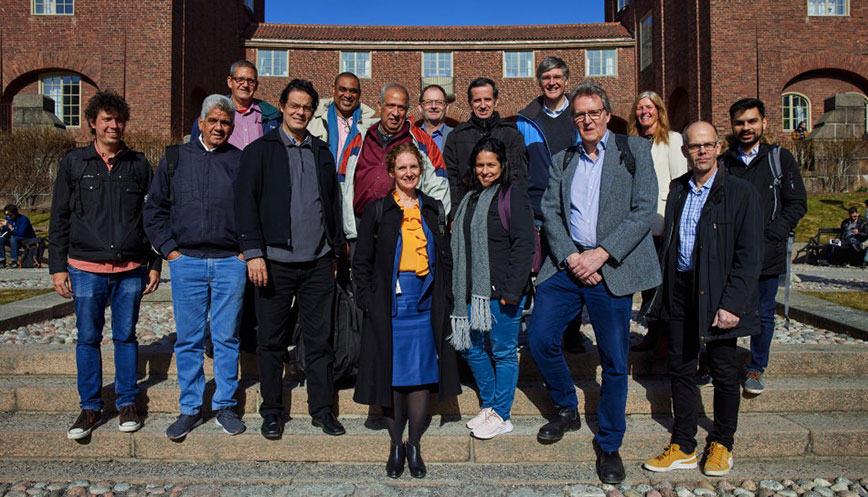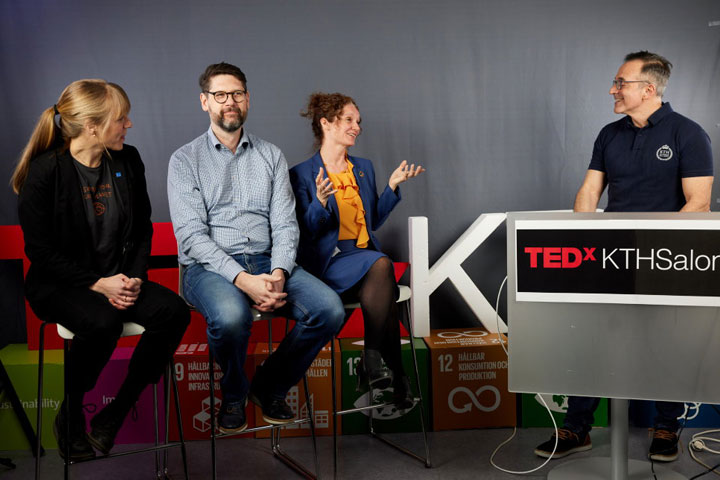Energy researchers from Cuba make study visit to KTH on search for knowledge and new collaborations

The KTH campus was bathed in spring sunshine when eight researchers from seven different Cuban universities arrived on a study visit to the KTH Energy Platform. Contacts made on this visit are set to form the basis for deeper co-operation between the two countries and the universities.
On 24 March, the KTH Energy Platform welcomed a study visit with participants from eight different Cuban universities. All the visiting researchers work in research and education in the field of energy.
“We hope this visit will increase opportunities for Cuban teachers and students to further develop their society in a sustainable direction. The visit paves the way for more contacts between KTH and the Cuban universities in,” says Mikael Östling, KTH Deputy President and director of strategic co-operation.

Week-long study trip
The study visit was part of a week-long trip that included universities in Belgium, Spain and Sweden. The trip culminated with day-long visits to KTH and Uppsala University to see energy research activities and learn more about the universities’ collaboration with industry.
“We wanted to visit KTH and Uppsala University because we saw how their research orientations complement each other and that they both have successful interdisciplinary approaches. It also made sense to combine the visits with our week in Europe,” says Deny Oliva Merencio, Dean, Faculty of Mechanical Engineering, Universidad Tecnológica de La Habana JAE.
One of the goals of the study trip was to improve domestic communication about research in the country, and create new opportunities for national and international collaboration.
“We hope to gain inspiration and knowledge that we can use to strengthen our national research network between our Cuban universities. We also want to learn more about KTH’s collaborations with the private sector,” says Janet Jiménez Hernández, professor at UDI, the Center for Studies of Energy and Industrial Processes, Universidad de Sancti Spiritus.
“One goal is to establish platforms at our universities in the future for better collaboration with businesses. These should be physical places where researchers, teachers and students can meet businesses and establish new collaborations,” she adds.
Energy Platform as host
The visit was hosted by Lina Bertling Tjernberg, KTH Energy Platform director, and Christophe Duwig, deputy director, who opened proceedings with an overview of the Platform’s work and how it relates to KTH's school organization and energy research.
Various key activities were highlighted to achieve this, including: study visits to research groups and labs, newsletters, seminars, doctoral courses and annual open days with KTH Energy Dialogue.
“The Energy Platform is an inclusive forum where all researchers interested in energy applications are welcome. The purpose is to create meeting places and initiate new ideas and collaborations,” Bertling Tjernberg said.

Together with Pierre Bodin, from Research Support Office , Bertling Tjernberg described KTH’s long tradition of industrial collaboration; they gave examples of cross-institutional projects, the activities of competence hubs, and the benefits of personal collaborations.
“Collaboration between researchers and international exchanges are key to successful research. This allows us to collaborate on common issues and theories in research as well as our different contexts. For example, Sweden has substantial natural resources such as water, wind and forests, and is not dependent on oil and natural gas like Cuba,” Bertling Tjernberg said.
Next up, Johan Blaus, co-ordinator of KTH’s strategic partnerships, provided an overview of the goal of strategic collaboration. He highlighted how industrial doctoral studentships are an excellent way to link academia and business. He also stressed the importance of staff exchanges between businesses and KTH.
“It’s important that our strategic partners participate in research and education development, and that they include organizations with close links to KTH that are open to being employers and want to share knowledge with their employees,” Blaus said.
Cutting-edge energy research with examples från EECS and CBH
The visit was characterized by talks and common research interests with a focus on wind, solar power and biomass as well as integration into the electricity grid.
Three current energy research projects at EECS and CBH were then presented, including Hamza Shafique who spoke about the “Flexible Grid and Solar Power” initiative. The project is based on three cases in Stockholm and Gothenburg that have developed new ways to combine solar panels with battery storage to cut power demand peaks and improve balancing in local electricity grids.

Henrik Nordström gave insights into a project aimed at creating conditions for using renewable energy sources such as wind and solar to improve balance in the electricity grid. The project includes simulations based on multiple years of weather data to identify new approaches and methods. Researchers also highlighted technologies and market-based solutions that can unlock improvements.
Lars Pettersson and Efthymios Kantarelis presented the broad-based research conducted at KTH into refining biomass for everything from heat and electricity to vehicle fuel. They spoke about several international projects where KTH is involved, and highlighted how a great deal of research and development is done in “live” projects at businesses and organizations. At the same time, there are research environments at KTH where businesses develop new technologies in collaboration with energy researchers.
After a visit to the laboratory at the Division of Fusion Plasma Physics, it was time for lunch followed by a tour of the KTH campus.
ITM School knowledge exchange
At the ITM School , Björn Laumert, professor and head of department, then showed the group the Solar Facility Lab. Anders Malmquist, professor at the Department of Energy Technology, was also on hand to show lab equipment for a lifelong learning course that gives students from all over the world the opportunity to control and monitor their lab experiments over the internet.

He also provided insights into the collaboration that already exists between the department and the Central University of Las Villas (UCLV) in Santa Clara, Cuba. Since 2015, there has been an exchange at Master’s level for teaching staff and students. In total, about 100 students from KTH have visited UCLV and about 10 UCLV students have come to KTH.

The initiative is run within the framework of the Linnaeus-Palme programme and has set in motion further co-operation within the EU’s Erasmus+ programme.
“It was especially fun to meet some of the people we have collaborated with at KTH in the EU’s Erasmus programme in which we develop global platforms for digital learning. We’d now like to see if we can find more opportunities for collaboration in research and education,” said Ariel Santos Fuentefría, Head of the Teaching Department of Electrical Engineering, Faculty of Electrical Engineering, Universidad Tecnológica de La Habana JAE.
KTH Innovation and live TEDxKTHSalon broadcast
The study visit ended at KTH Innovation, where the KTH Library broadcast a live episode of TEDxKTHSalon entitled “Towards Green and Clean Energy”.

Donnie Sc Lygonis, expert coach at KTH Innovation, moderated a conversation between Bertling Tjernberg, professor in power grids, Björn Laumert, professor of energy processes, and Anna Pernestål, director of the Integrated Transport Research Lab (ITRL). The conversation dealt with the challenges ahead associated with the transition to a fossil-free society, such as the integration of electricity from wind and solar, transmission capacity limitations, ways of using heat, and the latest developments in the transport sector. The conversation will be made available along with details of previous episodes:
The programme rounded off with a brief look at KTH’s activities to support innovation.
The last stop on the visit was a tour of the KTH Library.
Text: Magnus Trogen Pahlén
